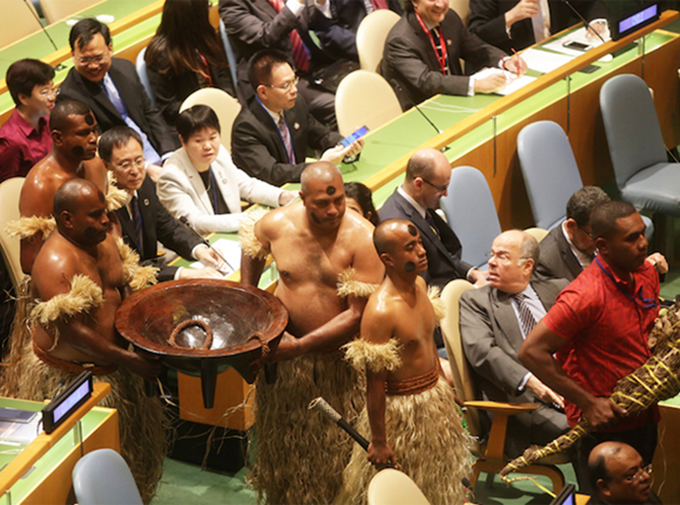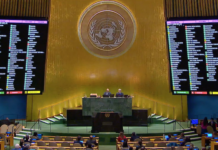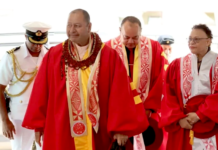OPINION: A Pacific World Oceans Day message from Youngsolwara Pacific and MISA4thePacific
As regional leaders gather in New York for the week-long United Nations oceans conference, we wish to recognise the Pacific’s storied history, as stewards of the world’s largest ocean. We acknowledge the test of time that this region has withstood, and commemorate those who have endure and withstood nuclear testing, a period in history with ramifications that are still felt by our oceans, lands, and peoples.
We remember this period as being a time when our oceans and people were utilised as guinea pigs by foreign powers. We acknowledge the issues both past and present that the Pacific faces, and we firmly refute the narrative that “we are victims’”.
We stand tall as the next generation of Pacific Islanders who shall also thrive on our sea of islands. We stand on the shoulders of the giants who went before us to make a stand.
On this note we call upon our Pacific and global leaders to take a stand against genocide. We, the Pacific, will not allow a repetition of colonialism.
Our peoples have suffered greatly from the destructive programmes of militarised colonial powers during the 20th century, continuing into the 21st. The legacy of nuclear testing throughout Oceania, in particular the Marshall Islands, French Polynesia, and elsewhere, has never been effectively remedied or addressed.
The consequences of detonating hundreds of nuclear bombs of a much greater destructive power than Hiroshima and Nagasaki atomic bombs are still being felt today by indigenous islanders – manifesting in, among other impacts, debilitating health and intergenerational maladies.
Runit Dome leaking
This legacy continues to threaten not just Pacific islanders and the Pacific Ocean, but the health and wellbeing of all the planet’s oceans and the people who depend upon them. Radioactive materials currently contained in Runit Dome on Enewetak Atoll in the Marshall Islands are leaking into the surrounding ocean and groundwater.
The Runit Dome was a haphazard attempt by the US military to contain 111,000 cubic yards of radioactive waste in an unlined crater. It was never replaced by a safe, permanent structure and instead is currently cracking and polluting the local surroundings.
Henry Kissinger in response to nuclear testing in the Marshall Islands, is quoted as stating: “There are only 90,000 people out there. Who gives a damn?” In response, we say: We are still here, and we are not going anywhere.
Cactus dome on Runit Island is testament to a history of experimentation, and the violation of our fundamental human rights. Leakage from the dome has resulted in the runoff of radioactive materials which poses serious concerns to the health of our oceans and the people who rely on them.
Parallels can be made with the ongoing contamination of our oceans as a result of terrestrial mining. Contaminants and runoff from existing mines remain a threat to the viability of our marine ecosystems. The oceans have still not recovered from the destructive acts of world wars, nuclear testing, and continued military maneuvers.
Intensified efforts must be made to demilitarise the oceans and to clean-up existing messes. As we the Pacific clamour for international action to halt carbon emissions, and desist from environmentally degrading activities, let us therefore be the change that we wish to see in the world.
Today, there are also parallels to be seen with the advent of extractive industries such as experimental seabed mining. Seabed mining is an issue that governments in the Pacific are still toying with.
No indigenous voices
Yet, this has not been tested anywhere else in the world. The discussion on seabed mining has proceeded narrowly for the past 30 years. There has not been inclusion of indigenous voices or much thought as to the inordinate risks in operating an untested extractive industry, in a fragile and almost completely unknown deep sea environment.
A recent joint study by 14 international universities and organisations discovered that hydrothermal vents and methane seeps on the ocean floor play a crucial role in regulating global climate – and that releasing or destroying them “would be a doomsday climatic event.”
In addition to likely and potentially irreversible environmental impacts, seabed mining is a long-term, experimental venture in which any potential profits for States must be offset by the short-term impacts, which could include destruction of local fisheries and resultant impacts on human health and livelihoods. There also remains the issue that on our ocean beds, plutonium from past nuclear tests has settled. Seabed mining can potentially act as a catalyst for the further dispersion of these contaminants.
It is, in short, a gamble, especially when compared to already profitable industries with a proven track record of sustainability such as ecotourism. Rather than shoulder inordinate risk in the hopes of a hypothetical, distant, and comparatively small cut of revenue, our Pacific governments should allow time for significantly more scientific study, and consider alternative partnerships with industries which, by their very nature, are inherently more sustainable.
We are once again faced with the same situation where foreign influences seek to utilise the Pacific for their own means. Our ocean cannot yet again be used as an experimental test bed for an activity whose full environmental ramifications are still not fully known.
We stand in solidarity with our brothers and sisters in New Ireland and the Duke of York Islands in Papua New Guinea, and call for a ban on experimental seabed mining in our waters. We call upon the peoples of the Pacific. We cannot allow such a repetition of experimentation that will again affect our oceans and our people.
Weathered test of time
We the Pacific have weathered the test of time. Over the millennia, our people have not simply survived, but thrived through the bounty of our oceans. With the advent of human induced climate change, the ocean that has nurtured us for millennia, has now become a threat to the existence of our islands. We call upon the leaders and peoples of the Pacific to further our efforts in making our voices heard. The United States has pulled out of the Paris accord, but we the people of “Wansolwara” (one salt water) remain committed.
Let us embrace the spirit of the Marshallese saying “Lappout Iene” which means to utilise or employ all the knowledge, skills and resources available to solve a problem. With this, we say that we the people of Wansolwara are in this together. When nuclear testing was occurring, the people of Wansolwara did not remain passive.
We call on our leaders to honour that proud legacy, and to Lappout Iene, make a stand and recognise and address the fact that our land, ocean and people have historically been used as guinea pigs to fuel the greed, defence needs, and convenience of foreign entities.
The advent of deep seabed mining is simply another evolution in this history of greed-fuelled economic exploitation, and a callous disregard for the environmental and human life. We the people of Wansolwara stand firmly opposed to militarism, environmental degradation, and the violation of our human rights. We are Oceania, we are Wansolwara, and we are the sea of islands.
We will not allow this history to repeat itself!
- Pacific Network on Globalisation (PANG) on behalf of Youngsolwara Pacific and MISA4thePacific, Tavini Huiraatira – Maohi Nui; Tourism and Hospitality Community Association (TAHCA) of the Republic of the Marshall Islands; Forum Against Mining On Choiseul (FAMOC) – Solomon Islands; and Oceania Resistance – Guam.
- The UN Ocean Conference
- Māori Television News on the UN Ocean Conference













































